Private legal practitioner Martin Kpebu has challenged the long-standing belief that Ghana’s civil service operates independently of political influence, insisting that in reality, it is deeply entangled with partisan agendas.
His remarks follow the recent controversy involving the dismissal and subsequent reinstatement of over 100 employees at the Bank of Ghana—a development that has reignited concerns over political interference in public institutions.
According to Kpebu, successive governments have consistently undermined the civil service’s neutrality by treating it as an extension of their political machinery.
“We say the civil service is neutral, but it is not true. If you listen to and read papers from very high-ranking officials, when it comes to the civil service, they are partisan. They help the government in power,” he stated in an interview with Joy FM on Friday, June 27.
He argued that political alignment, rather than competence or institutional loyalty, often determines a civil servant’s tenure and influence in office.
“When they help the government in power and the next one comes and says, ‘No, what you and the previous government were doing doesn’t align with my manifesto,’ you will go,” he explained.
Kpebu acknowledged that while some level of political influence is inevitable in a democracy, the extent to which it undermines institutional integrity in Ghana is alarming. He stressed that this pattern is deeply rooted in the country’s political culture and human nature.
“It can never totally go away, that one is clear, based on experience. From the nature of human beings, no, it cannot end,” he added.
His comments contribute to growing public discourse on the need to strengthen institutional safeguards and restore trust in public service structures. As calls mount for greater accountability and reform, Kpebu’s warning serves as a reminder of the urgency to insulate state institutions from excessive political control.


